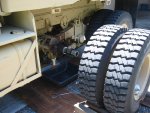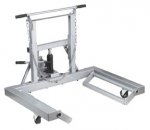As is the case with the A3, My truck is singled, but with 395's. I've had them on and off more times than I can remember, using only a bottle jack and jack stands, but I've never had to "muscle" or lift them. WORKING ON THE FLATEST GROUND YOU CAN, Just raise the jack so the tire is still on the ground, but the studs are free/loose in the bolt circle, then pivot/rock the tire and wheel clear of the studs and hub, and roll it wherever you want it. Always have a jack stand adjacent to the jack, with the mast raised as high as you can without taking any weight. Once the wheel is removed, lower the jack so the stand takes the weight. This frees up the jack so you can go to the next "corner" of the truck if you're removing multiple wheels. When reinstalling, put the truck in nuetral so you can rotate the hub by hand to easily line up the studs in the bolt circle(s) and you basically just reverse the processs (if you have any wheels still mounted, or when you get the first wheel reinstalled, always make sure at least one wheel is chocked front and back before lowering the jack or putting the truck in nuetral). If you're working on soft ground or pavement make sure you've got a large enough platform under the jack/stands to prevent sinking.




